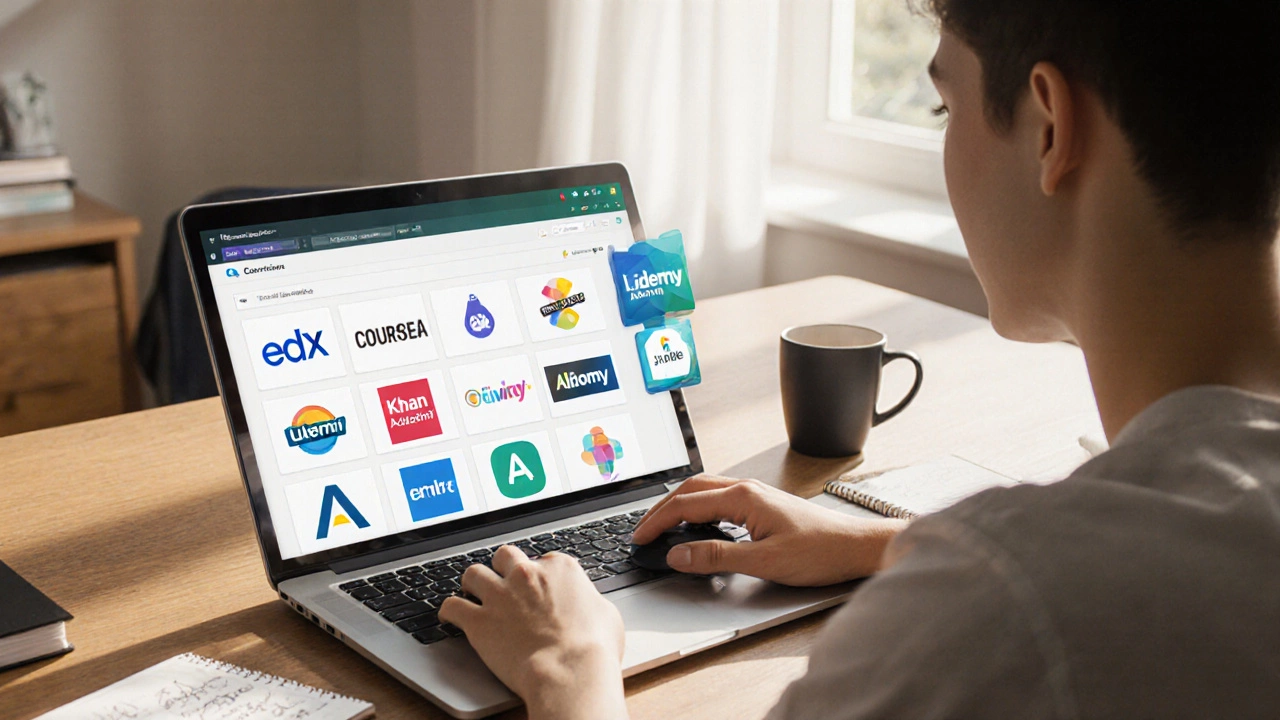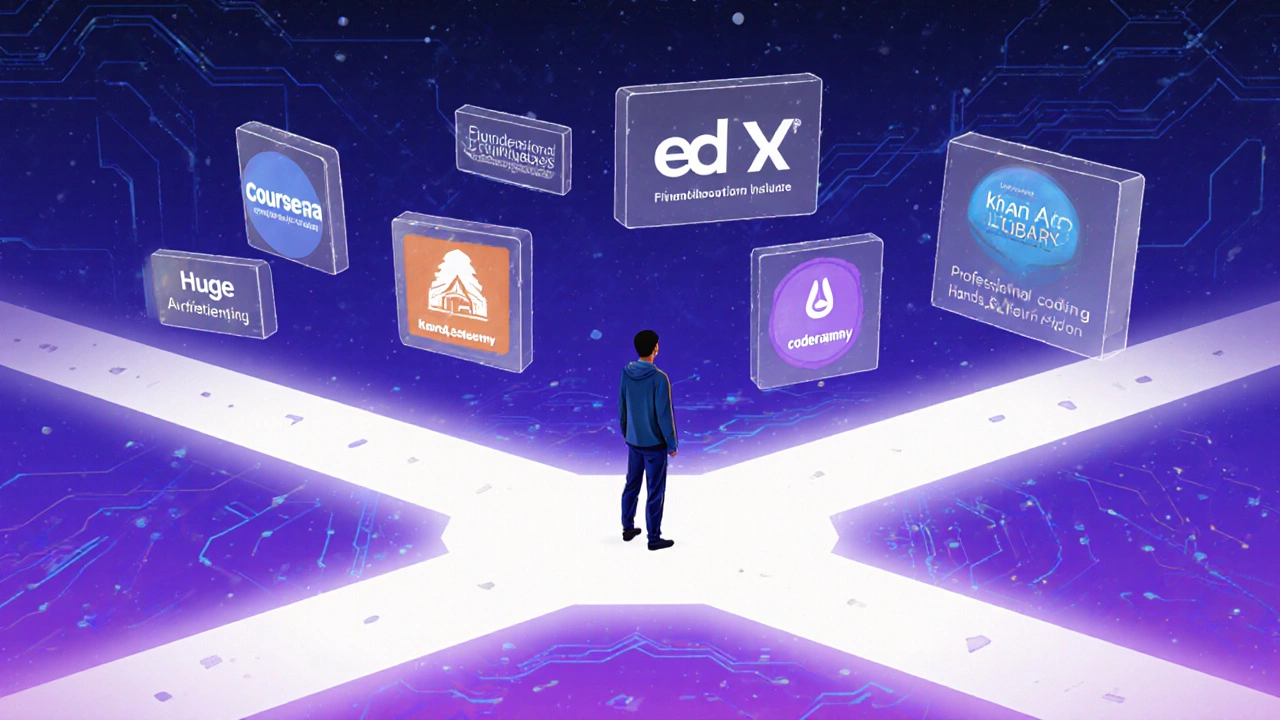
Free Course Platform Selector
Find Your Perfect Platform
Answer a few quick questions about your learning priorities to see which platform best matches your needs.
When you start hunting for free online course platforms that let you learn anything from programming to philosophy, the sheer number of options can feel overwhelming. This guide cuts through the noise by measuring each service against a set of practical criteria, so you can spot the best free courses platform for your goals.
Key Takeaways
- Coursera and edX lead on course variety and university partnerships.
- Khan Academy excels for K‑12 and foundational subjects, absolutely free.
- Udemy offers a huge marketplace; look for "free" filters and limited‑time promotions.
- FutureLearn and Alison are strong for short professional certifications.Codecademy’s free tier is ideal for hands‑on coding practice.
How We Judge Platforms
We focused on six factors that matter to most learners:
- Course Variety: breadth of topics and depth of specializations.
- Credential Value: whether the platform issues recognized certificates or badges.
- User Experience: interface quality, mobile app, and progress tracking.
- Offline Access: ability to download videos for learning without internet.
- Free Tier Limitations: how much content is truly free versus gated behind paywalls.
- Community & Support: forums, peer reviews, and instructor interaction.
Side‑by‑Side Comparison
| Platform | Course Variety | Free Certificate? | Mobile App | Offline Download | Notable Strength |
|---|---|---|---|---|---|
| Coursera | 200+ university partners, 4,000+ courses | Free audit, paid certificate (some scholarships) | iOS & Android | Yes (with paid subscription) | High‑quality university content |
| edX | MIT, Harvard & 150+ institutions, 3,500+ courses | Free audit, verified certificate for a fee | iOS & Android | Yes (with paid plan) | Strong academic rigor |
| Khan Academy | K‑12 math, science, economics, test prep | All content free, no formal certificate | iOS & Android | Yes (download videos) | Perfect for foundational learning |
| Udemy | Over 150,000 courses across all topics | Free courses available; most certificates paid | iOS & Android | No (except for paid courses) | Huge marketplace, frequent discounts |
| FutureLearn | 200+ courses, strong in healthcare & business | Free access for 14‑day windows; certificates paid | iOS & Android | Limited (requires subscription) | Social learning model |
| Alison | 1,000+ free diploma‑level courses | Free digital badge; printable certificates cost | No dedicated app (mobile web) | No | Focused on workplace skills |
| Codecademy | Programming & data‑science tracks | Free interactive lessons; full projects paid | iOS & Android | Yes (download lessons for offline) | Hands‑on coding environment |
Deep Dive Into Each Platform
Coursera
Coursera is a global MOOC provider that partners with top universities and companies. While you can audit most classes for free, the platform reserves the official certificate for paid learners. The free tier still gives you access to video lectures, readings, and community forums, making it a solid starter for anyone chasing a university‑level credential without spending a dime.
edX
edX was launched by MIT and Harvard in 2012. It mirrors Coursera’s audit model but shines with its MicroMasters and Professional Certificate pathways. If you’re looking for rigorous, research‑oriented courses, edX’s free audit mode gives you full lecture access and most assignments, though graded quizzes and certificates require payment.
Khan Academy
Khan Academy is a nonprofit platform funded by donations, so every lesson is truly free. It specializes in K‑12 subjects, test prep, and foundational college topics. While you won’t earn a formal certificate, the mastery system and progress dashboards are excellent for self‑paced learners.
Udemy
Udemy hosts an open marketplace where anyone can upload a course. The free catalog is smaller, but Udemy frequently runs promotions that turn paid courses into free ones for a limited period. Look for the "Free" filter and read reviews before enrolling.
FutureLearn
FutureLearn focuses on short, social‑learning courses from universities and cultural institutions. You can join for free and gain full access to videos and discussion boards for the course duration (usually 2‑4 weeks). Certificates are only available via a paid upgrade.
Alison
Alison offers diploma‑level courses in business, technology, and health. All learning materials are free, and you receive a digital badge at no cost. If you need a printable certificate for CV purposes, you’ll pay a modest fee.

Codecademy
Codecademy provides interactive coding lessons that run right in the browser. The free tier covers basic syntax and foundational projects; advanced paths and real‑world projects require a Pro subscription. The hands‑on approach makes it perfect for beginners who learn by doing.
Which Platform Fits Your Goals?
Think about what you value most:
- If you need accredited university material, start with Coursera or edX.
- For K‑12 or pure knowledge without a certificate, Khan Academy wins hands‑down.
- When you want a huge library and love hunting for free deals, Udemy is your playground.
- To gain quick professional badges without spending, explore Alison and FutureLearn.
- If learning to code is your goal, the free interactive labs on Codecademy are hard to beat.
Tips to Maximize Free Learning
- Sign up for platform newsletters - they often announce limited‑time free access.
- Use browser extensions that track price drops on paid courses.
- Combine multiple platforms: watch theory on Coursera, then practice on Codecademy.
- Leverage community forums for peer‑reviewed assignments and networking.
- Download videos when you have Wi‑Fi to study offline, especially on mobile.
Frequently Asked Questions
Can I get a legitimate certificate for free?
Most platforms reserve verified certificates for paid learners. However, some universities on Coursera and edX offer scholarships that cover the certificate fee, and Alison provides a free digital badge that employers increasingly recognize.
Are the free courses ad‑supported?
Generally no. Platforms like Khan Academy and Alison are nonprofit and run on donations. Commercial sites such as Udemy may show promotions, but they don’t force ads into the learning experience.
Do these platforms offer offline learning?
Coursera, edX, and Khan Academy allow video downloads via their mobile apps. Udemy and FutureLearn require a paid subscription for offline access. Check each app’s settings to enable downloads before you travel.
Which platform is best for career‑changing professionals?
Start with Coursera or edX for in‑depth specializations that align with industry standards. Complement those with short credential courses on FutureLearn or Alison to fill specific skill gaps.
Is there a limit to how many free courses I can take?
Most platforms impose no hard limit on audit enrolments. The only restriction is storage for offline videos and occasional “course caps” during promotional periods.
Next Steps
Pick one platform that matches your primary goal, create a free account, and enroll in a starter course today. If you hit a paywall for a certificate, revisit the scholarship pages or explore an alternative platform that offers the same content for free. Happy learning!
